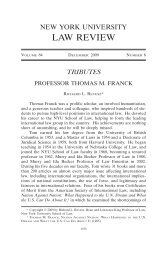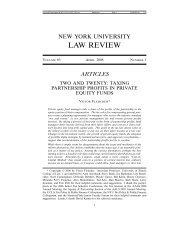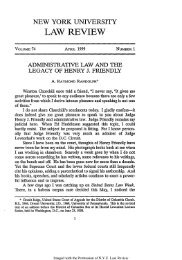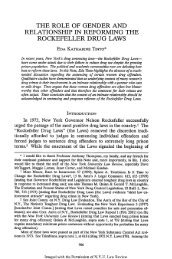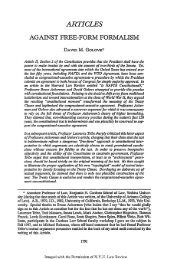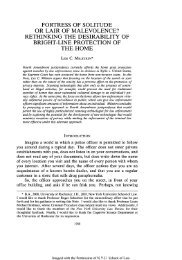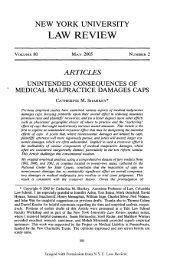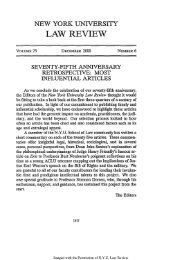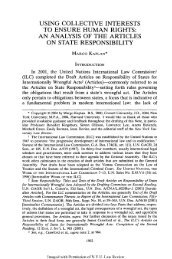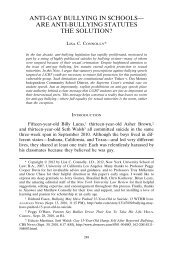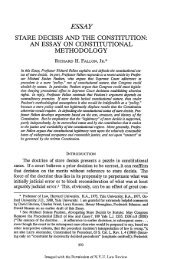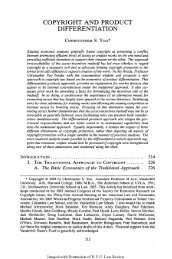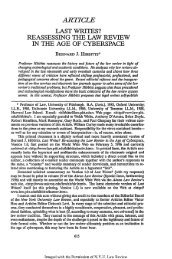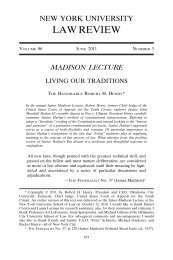Immigrants and the Right to Petition - NYU Law Review
Immigrants and the Right to Petition - NYU Law Review
Immigrants and the Right to Petition - NYU Law Review
You also want an ePaper? Increase the reach of your titles
YUMPU automatically turns print PDFs into web optimized ePapers that Google loves.
Imaged with <strong>the</strong> Permission of N.Y.U. School of <strong>Law</strong><br />
NEW YORK UNIVERSITY LAW REVIEW<br />
[Vol. 78:667<br />
5. Alien, Sedition, <strong>and</strong> Naturalization Act <strong>Petition</strong>s, 1798-1804<br />
A different sort of noncitizen petitioning was prompted by congressional<br />
enactment of anti-immigrant legislation in 1798.261 The<br />
Alien Act empowered <strong>the</strong> President <strong>to</strong> deport any noncitizen he<br />
judged <strong>to</strong> be a danger <strong>to</strong> <strong>the</strong> public or suspected of conspiring against<br />
<strong>the</strong> government. 262 The Sedition Act criminalized, among o<strong>the</strong>r<br />
things, "unlawful assembly" <strong>and</strong> <strong>the</strong> publication of false or malicious<br />
writing against <strong>the</strong> government. 263 The Alien Enemies Act, which remains<br />
in force, authorizes <strong>the</strong> President during wartime <strong>to</strong> arrest, imprison,<br />
or deport noncitizens deemed dangerous. 264 Finally, <strong>the</strong><br />
Naturalization Act significantly extended <strong>the</strong> residency requirements<br />
for obtaining citizenship. 2 65<br />
One his<strong>to</strong>rian of early American petitioning described <strong>the</strong>se enactments<br />
as <strong>to</strong>ge<strong>the</strong>r "creat[ing] <strong>the</strong> first minor flood of petitions <strong>to</strong><br />
descend upon Congress," 2 66 both for a general repeal <strong>and</strong> for individual<br />
relief. The laws were immediately controversial <strong>and</strong> not just with<br />
<strong>the</strong> Jeffersonian opponents of <strong>the</strong> Federalists. The Virginia <strong>and</strong> Kentucky<br />
Resolves famously condemned <strong>the</strong> Alien <strong>and</strong> Sedition Acts, 267<br />
<strong>the</strong> Supreme Court has termed <strong>the</strong>m unconstitutional, 68 <strong>and</strong> contemporary<br />
scholars nearly uniformly view <strong>the</strong>m as such. 269<br />
261 For an account of <strong>the</strong> debates that produced <strong>the</strong>se statutes, see Neuman, supra note<br />
73, at 52-60.<br />
262 Act of June 25, 1798, ch. 58, 1 Stat. 570, 570-71.<br />
263 Act of July 14, 1798, ch. 74, 1 Stat. 596, 596-97.<br />
264 Act of July 6, 1798, ch. 66, 1 Stat. 577 (current version at 50 U.S.C. §§ 21-23 (2000)).<br />
265 In 1795, Congress had established a five-year residency requirement for <strong>the</strong> naturalization<br />
of a "free white person," Act of Jan. 29, 1795, ch. 20, 1 Stat. 414, but <strong>the</strong> Federalists,<br />
seeking <strong>to</strong> maintain political power <strong>and</strong> concluding that noncitizens were a significant<br />
source of antifederalist sentiment, extended <strong>the</strong> rule <strong>to</strong> a fourteen-year residency requirement.<br />
Act of June 18, 1798, ch. 54, 1 Stat. 566. See Neuman, supra note 73, at 52-53<br />
(describing Federalist reaction <strong>to</strong> "importation of dangerous revolutionary ideas from<br />
France"). The Naturalization Act of 1798 was repealed in 1802. Act of Apr. 14, 1802, ch.<br />
28, 2 Stat. 153. The five-year residency requirement was res<strong>to</strong>red <strong>and</strong> remains <strong>the</strong> basic<br />
rule. See 8 U.S.C. § 1427(a) (2000).<br />
266 Don L. Smith, The <strong>Right</strong> <strong>to</strong> <strong>Petition</strong> for Redress of Grievances: Constitutional Development<br />
<strong>and</strong> Interpretation 112 (1971) (unpublished dissertation, available at Univ. Microfilms<br />
Int'l, 1986).<br />
267 See Thomas Jefferson, Virginia Resolutions of 1798, reprinted in 4 Debates on <strong>the</strong><br />
Adoption of <strong>the</strong> Federal Constitution 528 (pho<strong>to</strong>. reprint 1941) (Jonathan Elliot ed., 2d ed.<br />
Philadelphia, J.B. Lippincott 1888) [hereinafter Debates on Adoption]; Thomas Jefferson,<br />
Kentucky Resolutions of 1798 <strong>and</strong> 1799, reprinted in Debates on Adoption, supra, at 540.<br />
268 N.Y. Times Co. v. Sullivan, 376 U.S. 254, 276 (1964) ("Although <strong>the</strong> Sedition Act was<br />
never tested in this Court, <strong>the</strong> attack upon its validity has carried <strong>the</strong> day in <strong>the</strong> court of<br />
his<strong>to</strong>ry."); see also Lee v. Weisman, 505 U.S. 577, 626 (1992) (Souter, J., concurring)<br />
(describing Alien <strong>and</strong> Sedition Acts as "patently unconstitutional by modern st<strong>and</strong>ards").<br />
269 See, e.g., Sullivan, 376 U.S. at 276 (ga<strong>the</strong>ring sources); Larry Kramer, Underst<strong>and</strong>ing<br />
Federalism, 47 V<strong>and</strong>. L. Rev. 1485, 1519 (1994) (describing Alien <strong>and</strong> Sedition Acts as<br />
"about as clear an example of unconstitutional legislation as one could find").



